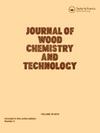Effectiveness of three Gabonese tree resin fractions combined with tebuconazole as wood preservative formulations
IF 1.7
4区 农林科学
Q2 MATERIALS SCIENCE, PAPER & WOOD
引用次数: 0
Abstract
Abstract Wood treatments based on oleoresins from Aucoumea Klaineana, Canarium schweinfurthii and Dacryodes edulis have shown interesting anti-termites properties but poor resistance to fungi and leaching. Oleoresins were combined with tebuconazole to produce both antifungal and anti-termite wood preservatives formulations with an expected better fixation of chemicals mixtures in the wood. Beech and Scots pine wood block samples were impregnated by these different formulations and exposed to white and brown rot, respectively, as well as to European termite (Reticulitermes flavipes). The use of aqueous formulations of each oleoresin of combined to tebuconazole improved the wood resistance against termites and mainly brown rot. In addition, the best formulation was found by using the raw resin from Aucoumea Klaineana. These results are mainly due to the antifungal activity of tebuconazole. In addition, the presence of antioxidant chemicals in the wood resins inhibits the wood decay fungi growth and acts as enzyme and metabolism inhibitors disturbing the treated wood digestion process by termites. For the future, the promising protection obtained should be formulated to be resistant to leaching.三种加蓬树树脂组分与戊康唑结合作为木材防腐制剂的有效性
摘要基于Aucoumea Klainana、Canarium schweinfurthii和Dacryodes edulis油树脂的木材处理显示出有趣的抗白蚁特性,但对真菌和浸出的抵抗力较差。将油树脂与戊唑醇结合,生产出抗真菌和防白蚁的木材防腐剂配方,有望更好地固定木材中的化学混合物。用这些不同的配方浸渍山毛榉和苏格兰松木块样品,并分别暴露于白腐病和褐腐病,以及欧洲白蚁(黄鳍散白蚁)。将每种油树脂的水性配方与戊唑醇组合使用,可以提高木材对白蚁和主要是褐腐病的抗性。此外,使用Aucoumea Klainana的原料树脂发现了最佳配方。这些结果主要是由于戊唑醇具有抗真菌活性。此外,木材树脂中抗氧化化学物质的存在抑制了木材腐朽真菌的生长,并作为酶和代谢抑制剂干扰了白蚁对处理过的木材的消化过程。对于未来,所获得的有前景的保护应该是耐浸出的。
本文章由计算机程序翻译,如有差异,请以英文原文为准。
求助全文
约1分钟内获得全文
求助全文
来源期刊

Journal of Wood Chemistry and Technology
工程技术-材料科学:纸与木材
CiteScore
3.70
自引率
20.00%
发文量
37
审稿时长
3 months
期刊介绍:
The Journal of Wood Chemistry and Technology (JWCT) is focused on the rapid publication of research advances in the chemistry of bio-based materials and products, including all aspects of wood-based polymers, chemicals, materials, and technology. JWCT provides an international forum for researchers and manufacturers working in wood-based biopolymers and chemicals, synthesis and characterization, as well as the chemistry of biomass conversion and utilization.
JWCT primarily publishes original research papers and communications, and occasionally invited review articles and special issues. Special issues must summarize and analyze state-of-the-art developments within the field of biomass chemistry, or be in tribute to the career of a distinguished researcher. If you wish to suggest a special issue for the Journal, please email the Editor-in-Chief a detailed proposal that includes the topic, a list of potential contributors, and a time-line.
 求助内容:
求助内容: 应助结果提醒方式:
应助结果提醒方式:


